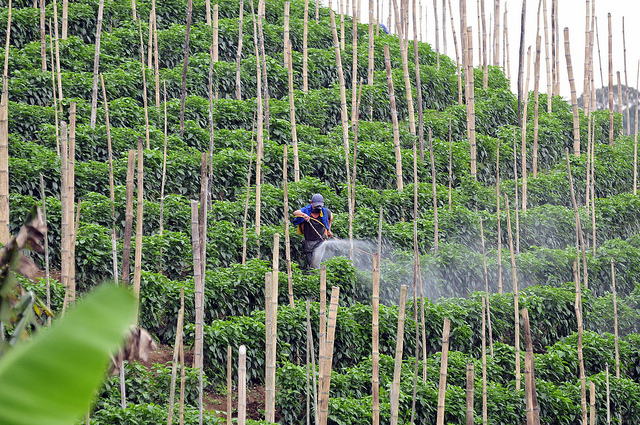President Donald Trump’s announcement that the United States will withdraw from the 2015 Paris agreement on climate change, has cast the accord’s ultimate effectiveness into doubt. Nevertheless, the deal has pushed countries to devise innovative methods for limiting their own carbon emissions. An assessment of IFPRI’s contribution to shaping Colombia’s path to meet its Paris targets provides useful lessons on incorporating research into policy-making.
To reach the Paris goal of holding a rise in global temperatures under 2 degrees Celsius, countries worldwide submitted commitments to reduce emissions, known as Nationally Determined Contributions (NDCs). Colombia confronted this challenge by creating a novel and inclusive process that brought together policy makers, researchers, and the private sector to inform policy goals.
Working closely with the end-users of the policy, Colombia’s Ministry of the Environment and Sustainable Development (known by its Spanish acronym MADS), together with the CGIAR Research Program on Climate Change, Agriculture and Food Security (CCAFS), played a convening or “boundary organization” role and created a space where open and frank dialogues could be held. This was essential to foster an interactive platform for stakeholders where a common understanding of the issue could be formed. A diverse set of actors from academic, governmental, and private-sector backgrounds convened to look at ways to reduce emissions in Colombia’s agriculture, forestry and land use sectors. This process broke down policy barriers from the start, allowing Policy-Oriented Research (POR) to equip decision makers with useful, actionable information.
The government of Colombia committed to a baseline for emissions through 2050. To guide stakeholders to meet that target, IFPRI and the Universidad de los Andes simultaneously conducted independent analyses on Colombia’s emissions data. Both partners crafted robust emissions reduction goals, based on varying scenarios in which Colombia improved its land use policies and reduced deforestation.
This interdisciplinary policy process was well-informed and ambitious because of sustained engagement with stakeholders, the strong presence of an institutional convening force, and flexible research-related resources provided throughout. The process revealed some key elements for effective future POR:
- Sustained consultations and openness. Colombia’s decision to maintain an open and participatory process allowed for the right policy questions to be asked, always in keeping with end users’ best interests. By framing climate issues with inputs from multiple institutions and stakeholders, the process incorporated flexibility in methods and approaches for tackling emissions reductions. Creating a “web of relationships” allowed for more comprehensive knowledge-building.
- Usable science and willingness to break disciplinary and institutional barriers. The ministries, institutions and individuals that took part in the research built a significant amount of mutual trust, creating a platform for long-term collaboration and lending the findings legitimacy among the partners. This admittedly time-intensive process allowed for “silos” to be broken down, and traditional sector barriers to be overcome, producing usable information for all.
- A champion for the project. The commitment from MADS to act as the champion of the research provided a guiding force to the process. It strengthened the ministry’s leadership role and cemented connections with partner institutions.
- Flexibility in the availability of resources. Due to the complex nature of the POR process, the flexibility that Colombia demonstrated was key to success. Allowing for sufficient funds, staff, and time allowed for a robust and informed dialogue to take place between institutions and end users, based on comprehensive analysis.
The POR process is not yet perfect; there is still fine-tuning to be done to ensure the integrity of data choices and explore the effects of participants’ assumptions. Nonetheless, the process proved a success in Colombia, ending with well-informed and usable policy research that guided the country forward on its climate goals.
NDCs often provide an insight into a country’s vision to promote transformative actions that address multiple, long-term social, economic and environmental issues. Colombia committed to a significant pledge (PDF), working toward a 20 percent reduction in GHG emissions by 2030, while pursuing set economic development targets. These ambitious goals have made Colombia a leader among countries acting to mitigate climate change. Now the country can move forward on a path of climate leadership knowing that its plans are achievable, and set its sights on global goals.
Alex De Pinto is a Senior Research Fellow in IFPRI’s Environment and Production Technology Division. For more information, read “Informing climate policy through institutional collaboration: reflections on the preparation of Colombia’s nationally determined contribution,” published in the Journal of Climate Policy.







